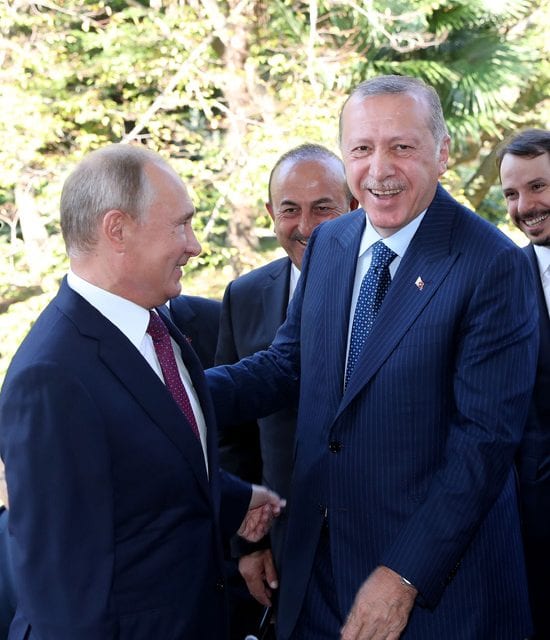By Ahval
The Turkish government’s turn toward Moscow and controversial purchase of Russia’s S-400 missile system has been driven by U.S. and Russian policies in Syria and could now lead to Turkey’s expulsion from NATO, said an analysis for the Central Asia-Caucasus Institute and Silk Road Studies Center.
In 2015, Ankara cancelled its planned $3.4 billion deal for a Chinese missile system, ostensibly because Beijing refused the guarantee the required technology transfer. Meanwhile, in its fight against the Islamic State, Washington allied with a Turkish enemy in Syria.
“The U.S. continued to deepen its military partnership with the Syrian Kurdish People’s Protection Units (YPG), enhancing the capabilities of a military force that Ankara regards as an existential threat due to its affiliation with Turkey’s outlawed Workers’ Party of Kurdistan (PKK),” Micha’el Tanchum, affiliated scholar with the Centre for Strategic Studies at Ankara’s Başkent University, wrote on Monday for Turkey Analyst, a publication of the Central Asia-Caucasus Institute and Silk Road Studies Center. “Displeased with Washington’s pro-Kurdish policies in Syria, Ankara moved closer to Moscow.”
The YPG’s June 2015 victory in Kobani raised the prospect of an autonomous Kurdish region along Turkey’s southern border in Syria, something Erdoğan vowed Turkey wouldnever allow.
Also in 2015, the Netherlands, Germany and finally the United States, ignoring Turkey’s appeals, removed their Patriot missile systems from Turkey, applying further pressure on Ankara to make a missile system purchase to maintain its defenses.
“As the worsening climate of mistrust between Ankara and Washington continued in 2016, Turkey and Russia initiated a process of rapprochement. Russian President Vladimir Putin’s unstinting support for President Erdoğan following the failed July 15, 2016 coup attempt in Turkey resulted in a tectonic shift in relations between Ankara and Moscow,” said Tanchum.
Three weeks after the coup attempt, Erdoğan met Putin three weeks after the failed coup, which is when the Russian president first floated the offer of S-400s to Turkey. By October 2016, Turkey was awaiting for Russia’s formal offer.
“The timing of Turkey’s turn-around on the purchasing of the Russian system seems to indicate some form of quid-pro-quo with Russia, as Moscow acceded to Turkey’s launching of its Operation Euphrates Shield in northern Syria on August 24, 2016,” said Tanchum, referring to the Turkey-led invasion of a broad area north of Aleppo. “Resulting in Turkey’s capture of the strategically located town of Jarabulus, the seven-month operation thwarted Kurdish efforts to create a contiguous territory west of the Euphrates,” he said.
In February 2017, weeks before the completion of Euphrates Shield, Turkey announced it would purchase the S-400 system. Twenty days after Turkey’s S-400 contract went into effect, in January 2018, Turkey launched a second military operation into northern Syria, capturing Afrin with Russian support.
The S-400 system is expected to arrive in Turkey in the next few months and be operation by October. The United States and its NATO allies see it as incompatible with NATO systems and posing a security threat to the F-35 stealth fighter.
Earlier this month, U.S. senators introduced a bill that included increased defence support for Turkey’s neighbours and halting the delivery of 100 U.S. F-35 fighter jets ordered by Turkey if it completes its purchase of Russia’s S-400 missile system.
Ankara’s drift toward Moscow was further reinforced by President Donald Trump’s backtracking on his planned troop withdrawal and threatening to “devastate Turkey economically” if it attacked the YPG, according to Tanchum.
Now Turkey faces sanctions and being forced out of the F-35 program.
“Such punitive measures would have drastic consequences: they would seal the divorce of Ankara and Washington, possibly even precipitating Turkey’s formal exit from NATO. Unless concessions are forthcoming from the U.S. to induce Turkey to reciprocate by finding a face-saving way out of installing the S-400 system, such as sending it to Azerbaijan, a strategic divorce may not be averted,” said Tanchum. “Although Ankara will seek to salvage its cooperation with European partners, Turkey will be on the path to joining a post-American alliance architecture.”



















